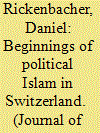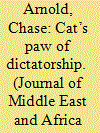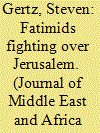|
|
|
Sort Order |
|
|
|
Items / Page
|
|
|
|
|
|
|
| Srl | Item |
| 1 |
ID:
172447


|
|
|
|
|
| Summary/Abstract |
When the Muslim Brotherhood (MB) was banned in Egypt in 1954, many of its followers and leaders found refuge and support in conservative Islamic countries, most notably in Saudi Arabia and Jordan. In the late 1950s, a Saudi diplomat approached the Swiss authorities with plans to open an Islamic Center in Geneva. From the beginning, the Swiss authorities welcomed the project, because it was supported by several pro-Western Arab countries, which opposed Egypt under Nasser. Swiss-Egyptian relations had been strained for some years because of Nasser’s socialist policies and Egypt’s espionage and propaganda operations in Switzerland. The Islamic Center eventually opened in 1960, and was headed by Said Ramadan, an exiled leader of the Muslim Brotherhood. Egyptian officials tried to thwart the Center’s activity and competed with it over influence on the small Arab student body then residing in Switzerland. As a politically active foreigner, the Swiss looked with suspicion on Ramadan. Still, they felt sympathy for his anti-Nasserist and anti-Communist stance, ignoring internal reports revealing the anti-Western and anti-Semitic nature upon his ideology. After 1966, the Swiss Ministry of Foreign Affairs believed Nasser’s Arab nationalism to be in terminal decline, expecting that Islamists might soon come to power in the Middle East. As a result, they decided to allow Ramadan and his family to remain in Switzerland despite overstaying their residence permits. This article sheds light on the founding years of the MB in Europe, a development still largely unchartered by historians, and the reaction of the Swiss to the appearance of a new phenomenon in Europe: political Islam. It argues that the context of Swiss-Egyptian relations is essential for understanding Swiss actions toward the Muslim Brotherhood.
|
|
|
|
|
|
|
|
|
|
|
|
|
|
|
|
| 2 |
ID:
172446


|
|
|
|
|
| Summary/Abstract |
In 1948, British authorities in the Gold Coast implemented a series of security reforms aimed at resisting future disruptions resulting from growing discontent with colonial rule. These reforms included the formation of a police intelligence organization, developed in collaboration with the British Security Service. This expansion of the colonial state into intelligence work preceded its first steps toward self-rule, inadvertently making this intelligence program an unintended participant in the process of decolonization. This article examines the foundations of that intelligence network and how it resisted the political exigencies required by the Gold Coast’s entry into diarchy. It explains how British officials arrived at the conclusion that a West African colony required a modern, intelligence-gathering apparatus under the oversight of the British Security Service and how that security system was used to challenge the realization of an independent Ghanaian state under the leadership of Kwame Nkrumah.
|
|
|
|
|
|
|
|
|
|
|
|
|
|
|
|
| 3 |
ID:
172444


|
|
|
|
|
| Summary/Abstract |
This study presents an Islamic vision of Jerusalem marked not so much by interreligious conflict but by intrareligious or sectarian concern. It does so by reexamining the decision of the Ismāʿīlī Fāṭimid caliph al-Ḥākim to destroy the Church of the Holy Sepulchre in the year 1009 as recorded in al-Maqrīzī’s Lessons for True Believers in the History of the Fatimid Imams and Caliphs. In the process, it considers the influence that a mosque built in honor of the second caliph ʿUmar b. al-Khaṭṭāb, conqueror of Jerusalem, may have had during the Fāṭimid era. The article also considers another significant event in Jerusalem recorded by the Crusader-era bishop William of Tyre, in which the Fāṭimid caliph al-Mustanṣir, fearing a Sunnī Saljūq advance on the city, forced the Christians of Jerusalem to build part of the city wall in the early 1060s. The work also looks briefly at the The Pillars of Islam, the main legal work of the formative Fāṭimid jurist al-Qāḍī al-Nuʿmān, to help demonstrate the connection between intrareligious and interreligious tension present in Fāṭimid thought. More generally, this article engages with and adds to a growing body of literature on religious identity formation, which seeks to understand the process of how a community goes about forming its religious identity in the context of surrounding influences as well as through its internal development.
|
|
|
|
|
|
|
|
|
|
|
|
|
|
|
|
| 4 |
ID:
172445


|
|
|
|
|
| Summary/Abstract |
This article examines the Spanish army during the decolonization of Morocco, and it explores the connection between Spanish cultural perceptions – seen most clearly in the myth of Spanish-Moroccan brotherhood – and strategic and operational failures. It pays particular attention to the views of Spain’s last High Commissioner in Morocco, Lieutenant General Rafael García-Valiño, and the Franco dictatorship’s ideologue of Spanish imperialism in North Africa, the influential army officer and prolific writer Tomás García Figueras. Highlighting the diversity in outlooks within Spanish military culture, the study explores why key military africanistas did not see what was coming so that they might have prepared better for the departure process. This failure left the Spanish army in unwinnable, humiliating, and in some cases fatal predicaments, and it has had consequences that linger to this day.
|
|
|
|
|
|
|
|
|
|
|
|
|
|
|
|
|
|
|
|
|